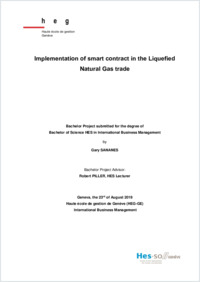Implementation of smart contract in the Liquefied Natural Gas trade
SONAR|HES-SO
- Sananes, Gary
- Piller, Robert (Degree supervisor)
-
2019
60
Mémoire de bachelor: Haute école de gestion de Genève, 2019
English
In this Bachelor thesis, we will study all the key aspects for the implementation of a smart contract for a Liquified Natural Gas (LNG) trade. As starting point, a brief introduction about LNG is written to realise the specificities of the commodity traded. Then, smart contracts will be presented as well as its fundamental goal and the key concerns about how English law is regulating them. Furthermore, we will learn that a smart contract, to respect legal requirements, is more eligible to work based on a “normal” contract. Therefore, an analysis will be conducted to choose a contract being the most suitable for a trade and fitting the best for the implementation phase. By chance, professional contracts written by large companies in the domain are available on internet. Once the result of the analysis and comparison allows us to choose one contract, it needs to be shaped and formatted in a way to make it clear and easy to understand for a programmer to code it. The tool which enables this process is flowchart, which shows how contracts are predicting every situation and how clauses are interconnected. In addition, a deep understanding and explanation of the contract will allow us to learn in depth how the deal is conducted and important characteristics to take into consideration about LNG. Smart contracts are mostly implemented on blockchain or at least platforms using blockchain technology which meant we could not make us escape the subject of blockchain technology. Therefore, we will have to first gain basic knowledge and note the difference between private and public blockchain. The next step will be to explore the question of which blockchain or platform the smart contract would be run and go through the main ones developed which are Ethereum, Hyperledger Fabric and R3 corda to conclude that Hyperledger is the most suitable. Finally, for the last part, we will consider the implementation phase requiring certain computer science knowledge and more time than initially forecasted. We will come up with a solution allowing us to go deeper into the subject and to have a full implementation of the contract chosen in the near future. The solution brought is the double bachelor thesis. It consists to ask a student from “Informatique de gestion” which is a computer science branch of HEG to make his bachelor thesis on the second part of my bachelor thesis.
- Language
-
- English
- Classification
- Economics
- Notes
-
- Haute école de gestion Genève
- International Business Management
- hesso:hegge
- License
-
License undefined
- Identifiers
-
- RERO DOC 327906
- Persistent URL
- https://sonar.ch/global/documents/314920
Statistics
Document views: 194
File downloads:
- Mémoire: 290
